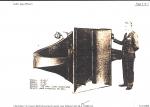The shipper laid the back of a transducer on styrofoam in poor attempt at boxing and it of course moved around working styro bits through the vent screen into the vent itself. Anybody got any suggestions on how to get it out without removing the screen thereby ruining it and/or the foil sticker on back?



 Reply With Quote
Reply With Quote





 That is precisely what I was thinking of... actually. If HtC's dustcap
That is precisely what I was thinking of... actually. If HtC's dustcap 